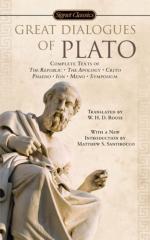
|
| Name: _________________________ | Period: ___________________ |
This test consists of 15 multiple choice questions and 5 short answer questions.
Multiple Choice Questions
1. What is one of the reasons that Crito offers for coming to visit Socrates?
(a) Crito misses Socrates.
(b) If Crito didn't come to try to rescue Socrates, it would reflect poorly on himself and Socrates' supporters.
(c) Socrates asked Crito to come.
(d) Crito wants to find out what to do with Socrates' sons.
2. According to Socrates' opinion, what does the common man's simple mind cause him to mistake?
(a) A ceasing of pain for pleasure.
(b) Examples for definitions.
(c) Reason for illogic.
(d) Emotions for arguments.
3. What is Crito's relationship to Socrates?
(a) Crito is a Sophist, one of Socrates' enemies.
(b) Crito is Socrates' cousin
(c) Crito is a wealthy disciple of Socrates.
(d) Crito is a jail guard.
4. How does Crito plan to aid Socrates?
(a) Crito wants to secretly bring Socrates food.
(b) Formally appeal Socrates' case to a superior court.
(c) By using his wealth and influence, Crito plans to get Socrates out of prison.
(d) Crito doesn't want to help Socrates.
5. According to Socrates' opinion, what is the third happiest social class of man in the world?
(a) The democratic man.
(b) The atheistic man.
(c) The tyrant.
(d) The philosophy student.
6. The evil of the soul, explained in Book X by Socrates, is ___________.
(a) Dishonesty.
(b) Treason.
(c) Injustice.
(d) Fire.
7. What must the philosopher, according to Socrates in Book VI, employ in order to attain knowledge of "absolute good"?
(a) Judgment against "absolute evil."
(b) Public opinion of theoretical subjects.
(c) Hypotheses about what is good in the world.
(d) Guessing and hoping he gets lucky.
8. Where does Crito take place?
(a) A temple.
(b) A jail.
(c) Agathon's house.
(d) The marketplace at Athens.
9. "A good man [who is] grieving," says Socrates," will attempt to moderate his grief through _________."
(a) Disgust.
(b) Reason.
(c) Emotions.
(d) Skepticism.
10. As a consequence of an elevated state of mind, Socrates explains that philosophers often have trouble_________.
(a) Apprehending absolute truths.
(b) With sensible and mundane activities.
(c) Being professional.
(d) Focusing on complicated issues.
11. Adeimantus interrupts Socrates in the beginning of Book VI to ask him ____________.
(a) Why he wants philosophers to rule the city.
(b) Why philosophers are either useless or evil.
(c) When students get to become full-fledged philosophers.
(d) Whether philosophy is an activity or a profession.
12. When Phaedo first arrives at the prison, what is Socrates doing?
(a) Speaking to the guards.
(b) Writing poetry.
(c) Meditating.
(d) Crying like a madman.
13. Who is Cebes?
(a) Son and father.
(b) Slave and master.
(c) Ally and enemy.
(d) Husband and wife.
14. Who said, "the unexamined life is not worth living"?
(a) An unnamed member of the Athenian Council.
(b) Cherephon.
(c) Meletus.
(d) Socrates.
15. The tyrannical man, according to Socrates, is characterized by___________.
(a) A lack of temperance or restraint in any of his desires.
(b) Extreme paranoia.
(c) A quickness to express wayward thoughts.
(d) Spending money frivolously.
Short Answer Questions
1. In his discussion of education, Socrates says that arithmetic, geometry, and physics are worthwhile pursuits for which two groups of people?
2. What is Socrates' view on the nature of death, particularly his own?
3. After the verdict, Socrates warns the Athenian jury that________.
4. According to Socrates' opinion, what is the second happiest social class of man in the world?
5. What does Crito want Socrates to do?
|
This section contains 657 words (approx. 3 pages at 300 words per page) |

|




